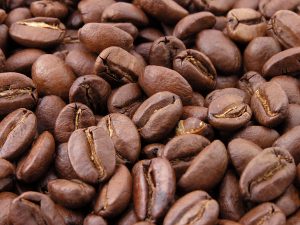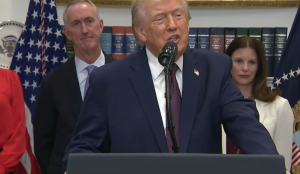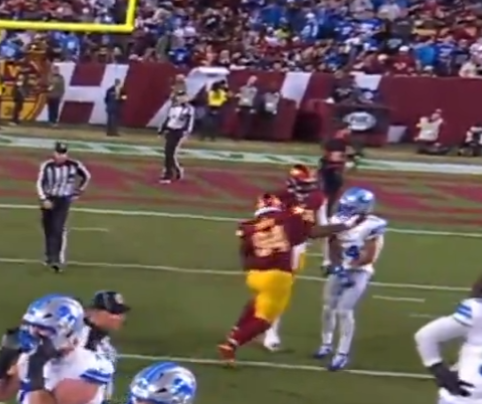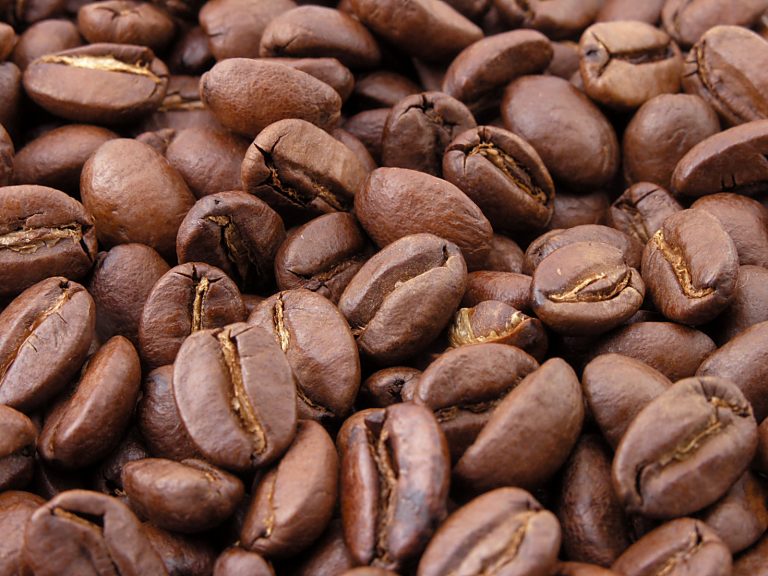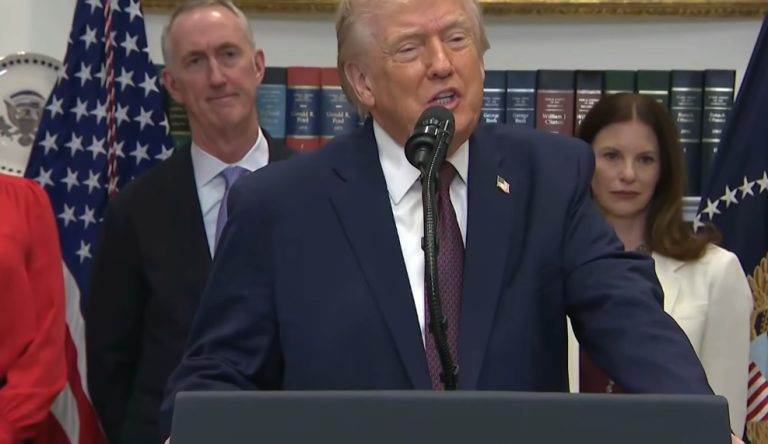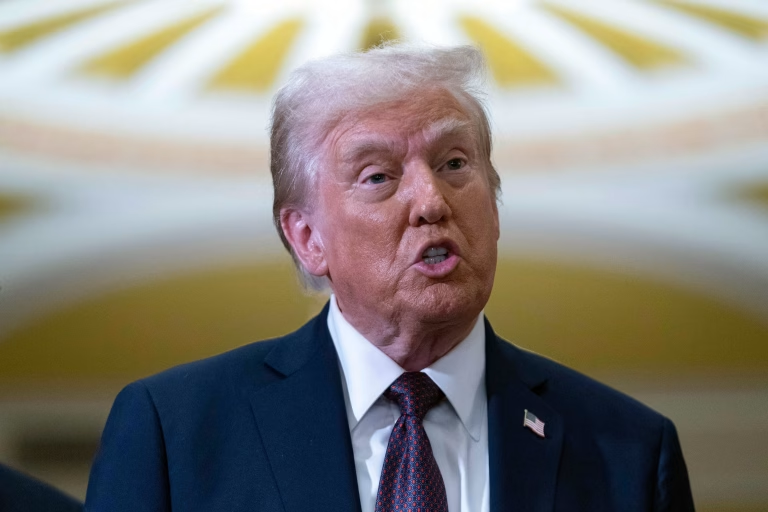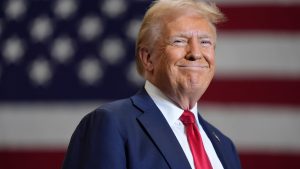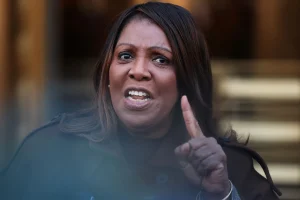Tensions flared during Sunday’s heated NFL clash between the Detroit Lions and the Washington Commanders, as an on-field altercation led to the ejection of Washington defensive lineman Daron Payne. The incident occurred shortly after Detroit wide receiver Amon-Ra St. Brown celebrated a touchdown with what many described as a “Donald Trump gesture” — a move that immediately went viral and sparked outrage, debate, and even political commentary across social media.
The November 9 matchup, held at Northwest Stadium, wasn’t just another regular-season game. It was already a historic occasion: President Donald Trump became the first sitting U.S. president in over five decades to attend a regular-season NFL game. His surprise appearance added a unique atmosphere to an already high-stakes contest, with emotions running high both on the field and in the stands.
A Presidential Appearance Like No Other
Trump arrived fashionably late, just minutes into the second quarter, drawing a mixture of boos and cheers from the crowd as he made his entrance. Accompanied by Secret Service agents and members of his administration, the president briefly addressed fans from his private box suite, microphone in hand. However, his remarks were largely drowned out by a sea of reactions — some chanting his name in support, others loudly voicing their disapproval.
It was a scene emblematic of the country’s ongoing political polarization, now finding its way into America’s most-watched sport. “You could feel the tension even before kickoff,” one fan in attendance said afterward. “Half the crowd wanted to shake his hand, the other half wanted to drown him out. It was electric, but uneasy.”
The Gesture That Sparked Chaos
In the third quarter, with the Lions leading comfortably, St. Brown caught a touchdown pass and decided to mark the moment with a spontaneous, lighthearted celebration. Turning toward Trump’s suite, he pointed upward, mimicking one of the president’s well-known dance moves — a slightly exaggerated finger-point and shuffle that went viral during Trump’s 2020 campaign rallies.
“I just thought it’d be funny,” St. Brown later told reporters. “I heard Trump was going to be at the game, and honestly, how often does that happen? It was just a bit of fun, nothing serious.”
What St. Brown didn’t realize, however, was that the president had already left his box moments earlier. The timing, paired with the highly visible nature of the gesture, immediately caught the attention of Washington defender Daron Payne — and not in a humorous way.
From Celebration to Confrontation
Within seconds of the celebration, Payne approached St. Brown during the post-play sequence, reportedly shouting something inaudible to cameras before throwing a punch to St. Brown’s helmet area. The blow, though not causing serious injury, was enough to send shockwaves through both sidelines and prompt immediate intervention from referees.
The officials quickly ejected Payne from the game for unsportsmanlike conduct and physical aggression. Teammates and coaching staff from both sides rushed in to separate players and calm tensions, but the damage was already done. The moment was captured from multiple camera angles and instantly circulated online, sparking intense discussion.
Social media erupted within minutes. One user wrote on X (formerly Twitter), “As a leader of Washington’s defense, Daron Payne should know better than to throw a punch on the field. He should be suspended. There’s no place for this in sports.” Another posted, “You can’t do that, especially in front of the President. Stupid move, totally avoidable.”
Locker Room Reactions
After the game, players from both teams spoke about the altercation. Payne declined to comment directly but appeared visibly frustrated while leaving the locker room. However, teammate Javon Kinlaw came to his defense, claiming the ejection was unfair.
“Daron only retaliated because the refs literally saw the first punch,” Kinlaw said, though no footage has confirmed St. Brown throwing any strike. “It’s a physical game — emotions run high, especially in a moment like that. I don’t blame him for reacting.”
Commanders head coach Ron Rivera tried to downplay the incident, telling reporters that “things got heated” but that Payne “let his emotions get the best of him.” He confirmed that the team would review the footage and “handle any disciplinary matters internally.”
The Lions’ side took a more measured tone. Head coach Dan Campbell emphasized that his player’s celebration was not meant to provoke. “Amon-Ra was just having fun. He’s a competitor, and that’s how he expresses himself. We don’t condone taunting, but it didn’t deserve a punch.”
NFL Statement and Possible Suspension
The NFL released a brief statement late Sunday night confirming that Payne’s ejection was under review and that additional disciplinary action could follow. League rules are clear that any act of striking another player is grounds for ejection and possible suspension.
“The NFL maintains a strict policy against physical altercations,” the statement read. “Player safety and sportsmanship remain top priorities. The incident involving Daron Payne will be reviewed according to league protocol.”
Sports analysts have speculated that Payne could face a one- or two-game suspension, depending on the league’s assessment of intent and provocation.
“This isn’t the first time we’ve seen emotions boil over,” ESPN analyst Marcus Spears said. “But given the political undertone here — the fact that it happened in a game attended by the President — this moment is going to be talked about for a while.”
Politics and the Gridiron
The event reignited the long-running debate about politics in sports. Ever since Colin Kaepernick’s 2016 protest during the national anthem, the NFL has been at the center of cultural and political crossfire. Trump himself has weighed in many times, previously criticizing players who kneel or make political statements on the field.
This time, however, it was the opposite: a player referencing the president in a lighthearted way that unintentionally led to violence.
Political commentator Lisa Reynolds told Reuters, “What’s fascinating here is the symbolism. A playful Trump gesture turns into a physical altercation — that says a lot about where America is right now. Everything is interpreted through a political lens.”
Fans, too, seemed divided. Some praised St. Brown for “having fun with it,” while others accused him of disrespecting the office of the president. Meanwhile, Payne’s defenders said his frustration reflected the “constant politicization of the game.”
The Fallout Online
Within hours, hashtags like #TrumpGesture, #PayneEjected, and #NFLFight were trending on X. Memes flooded social media, some showing edited clips of Trump’s dance next to St. Brown’s celebration, others mocking Payne’s reaction.
NFL-focused pages joined the frenzy, with one viral post from “NFL Memes” reading:
“Daron Payne just randomly punching Amon-Ra St. Brown is sending me 😭.”
While the humor spread, many fans also voiced disappointment that an otherwise exciting game — which the Lions won 44–22 — was overshadowed by controversy.
Trump’s Response
As of Monday morning, the White House had not issued an official statement about the incident. However, sources close to the president told several media outlets that Trump was aware of what happened and found the situation “amusing rather than offensive.”
“He thought the whole thing was funny,” one aide said anonymously. “He likes when sports have energy, competition, and a little bit of flair. He didn’t see it as disrespect — he actually laughed about it.”
The president reportedly left the stadium before the fight took place, returning to Washington shortly after halftime.
Looking Ahead
For the Lions, the win pushed them closer to securing their divisional lead, while the Commanders’ season continued to falter. But the headlines were less about football and more about the broader implications of the event — the intersection of sports, politics, and personal emotion.
Sports psychologists have long noted that such high-intensity environments can magnify emotional responses. “In games like this, with extra attention from the public and the presence of a polarizing figure like the president, players’ adrenaline and anxiety skyrocket,” explained Dr. Hannah Mercer, a sports behavior specialist. “Even a harmless joke can trigger an outsized reaction.”
As the NFL reviews footage and deliberates Payne’s punishment, fans and commentators alike are left reflecting on how America’s divisions continue to play out — even on the turf of a football field.
Conclusion
What began as a historic NFL moment featuring a sitting U.S. president attending a game ended in controversy, viral clips, and a national conversation about respect, rivalry, and restraint. While Amon-Ra St. Brown insists his gesture was “just for fun,” Daron Payne’s impulsive punch has ensured that this matchup will be remembered for much more than its final score.
In an era where politics, sports, and pop culture collide more than ever, Sunday’s game was yet another reminder: in the modern NFL, nothing — not even a touchdown dance — happens in a vacuum.

Emily Johnson is a critically acclaimed essayist and novelist known for her thought-provoking works centered on feminism, women’s rights, and modern relationships. Born and raised in Portland, Oregon, Emily grew up with a deep love of books, often spending her afternoons at her local library. She went on to study literature and gender studies at UCLA, where she became deeply involved in activism and began publishing essays in campus journals. Her debut essay collection, Voices Unbound, struck a chord with readers nationwide for its fearless exploration of gender dynamics, identity, and the challenges faced by women in contemporary society. Emily later transitioned into fiction, writing novels that balance compelling storytelling with social commentary. Her protagonists are often strong, multidimensional women navigating love, ambition, and the struggles of everyday life, making her a favorite among readers who crave authentic, relatable narratives. Critics praise her ability to merge personal intimacy with universal themes. Off the page, Emily is an advocate for women in publishing, leading workshops that encourage young female writers to embrace their voices. She lives in Seattle with her partner and two rescue cats, where she continues to write, teach, and inspire a new generation of storytellers.
